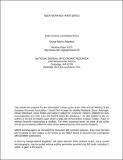Frictional Coordination
Author(s)
Angeletos, George-Marios
DownloadSubmitted version (484.9Kb)
Terms of use
Metadata
Show full item recordAbstract
The notion that business cycles are driven by fluctuations in aggregate demand is subtle. I first review some of the conceptual and empirical challenges faced when trying to accommodate this notion in micro-founded, general-equilibrium models. I next review my own research, which sheds new light on the observed business cycles by accommodating frictional coordination in the form of higher-order uncertainty. This makes room for forces akin to animal spirits even when the equilibrium is unique. It allows demand shocks to generate realistic business cycles even when nominal rigidity is absent or undone by appropriate monetary policy. It modifies the general-equilibrium predictions of workhorse macroeconomic models in manners that seem both conceptually appealing and empirically relevant. And it offers new guidance to policy.
Date issued
2018Department
Massachusetts Institute of Technology. Department of EconomicsJournal
Journal of the European Economic Association
Publisher
Oxford University Press (OUP)